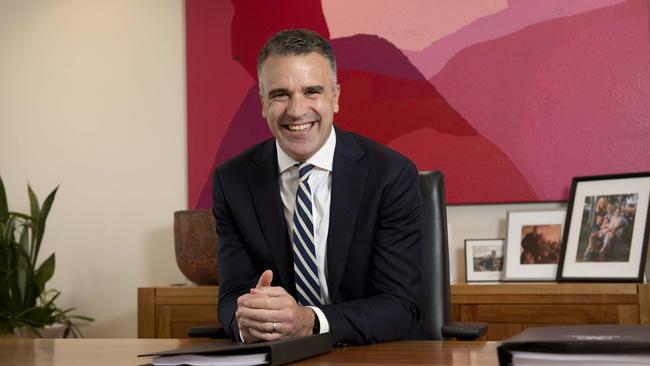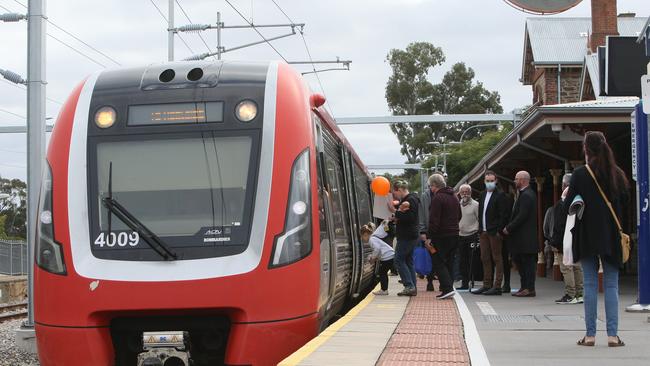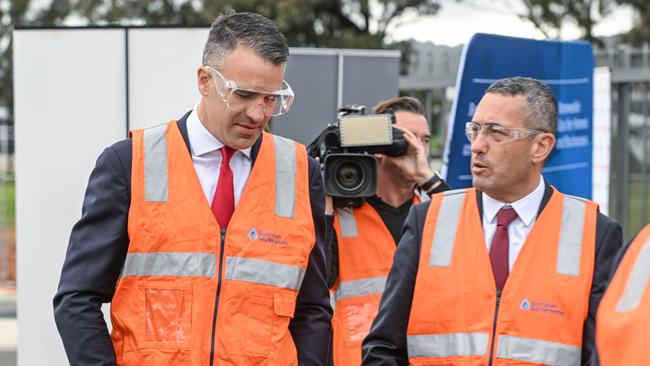Premier Peter Malinauskas’s plan to arrest skills shortages and grow defence jobs
Premier Peter Malinauskas has unveiled a detailed plan to overcome skilled worker shortages to fuel a defence industry boom, with migrants to fill the gap of retiring Baby Boomers.
SA News
Don't miss out on the headlines from SA News. Followed categories will be added to My News.
A 10,000-job defence boom will make Holden car manufacturing “look like small beer”, says Premier Peter Malinauskas, who is spearheading the hunt for skilled workers.
In an exclusive interview with The Advertiser, Mr Malinauskas revealed his biggest fear about building nuclear-powered submarines in Adelaide was the ongoing shortage of highly qualified graduates and workers needed for the complex project.
He will take a plan to Thursday’s Jobs and Skills Summit in Canberra for a taskforce to accelerate and oversee defence industry education, training and recruitment.
This would be charged with ensuring SA has the workforce and skills to deliver existing major defence projects, such as the $45bn project to build nine frigates at Osborne Naval Shipyard, and planned nuclear-powered submarines.
Job numbers at Osborne alone are forecast to surge from 2800 to 5000 by 2027 and more than 9000 by 2037.

Ahead of Thursday’s national jobs summit, Mr Malinauskas argued SA was at full employment and sufficient skilled worker supply was the biggest risk to the project to build “the most complex machines on the planet” at Osborne, under the AUKUS agreement to build UK or US nuclear-powered submarines.
“Clearly, from a parochial perspective, we want to maximise the opportunity that comes out of AUKUS, or the naval shipbuilding program; 10,000 people – this makes Holden look like small beer,” he told The Advertiser.
“Of course, the level of technical jobs involved, the level of skills that we’re talking about, is exponentially higher, which speaks to higher skills, means higher wages and more security.”
Holden’s Elizabeth plant, which closed in late 2017, employed 3400 people in 2008 and produced more than 100,000 cars for domestic and export markets.
Mr Malinauskas will push for a state/federal SA Defence Industry Workforce and Skills Taskforce, which would be charged with making recommendations to ensure skilled worker shortages could be overcome to meet demands for the nation’s defence.
This would include examining education, training and employment programs; growing the pipeline of science, technology, engineering and maths graduates; transitioning skilled workers from other industries; and aligning state and federal workforce development strategies.
“I think that our defence industry base here in South Australia is world-class – for the volume of work that has been coming our way we punch above our weight,” Mr Malinauskas said.
“ … But we’re going to have to take another step up again. And that is going to require the Commonwealth and the state, along with the industry, working hand in glove to make sure the training is delivered.”

Mr Malinauskas also:
SPELLED out a year-end, to-do list, which included detailing sites and plans for the $2bn-plus new Women’s and Children’s Hospital and $80m Adelaide Aquatic Centre.
INSISTED a plan to transition Adelaide’s privatised rail network to public operation would be completed by year’s end or early next year.
VOWED to demonstrate to voters that his government would “have a permanent sense of urgency” about honouring and delivering election promises.
REVEALED his first overseas trip as Premier would be to Japan and South Korea from October 10-15, to pursue hydrogen industry opportunities.
URGED an increase in humanitarian visa intake, arguing immigrants were “looking for opportunity” and the “ability to work”.
Mr Malinauskas said skilled and humanitarian migration needed to be contemplated, because the public and private sectors were struggling to find workers.
“This might be seen as being controversial, but we’re at full employment. I mean, if you wake up today, and you don’t have work, and you want to find it, you’re going to get it,” he said.
“ … So it’s quite extraordinary that (at) 4 per cent, which is the second-lowest unemployment rate we’ve ever had in South Australia since records have been kept, we still find ourselves with the highest unemployment rate in the nation.
“But you cannot talk to skilled, unskilled, private sector, public sector – you can’t speak to anyone at the moment who isn’t saying the biggest challenge is finding people.”

WHY SA MUST OPEN DOORS TO MIGRANTS
South Australia must open its doors to more migrants, skilled and unskilled, to fill gaps in the workforce left by retiring Baby Boomers, Premier Peter Malinauskas says.
As the state’s population ages and labour is in historically high demand, Mr Malinauskas said that more workers were needed.
“I think it is healthy to have an aspiration to grow the population and we need to grow the population in terms of our workforce base because we’re going to need that as Baby Boomers increasingly exit the workforce,” he said.
“But it’s got to be done in a sustainable way, and you’ve got to be willing to make the long-term decisions around investments, particularly around infrastructure … to actually be able to manage and accommodate that.”
However, he said skilled migration should not be the only strategy used to bolster the workforce.
“I also think we should be looking at the humanitarian visa intake, which may include some skilled people and might include some unskilled people,” he said.
“There’s a shortage of unskilled labour as much as there’s a shortage of skilled labour at the moment.
“The simple fact is that if you’re willing to pack your bags up from a far-flung place on the globe to move your family to Australia, you’re only doing that because you’re looking for opportunity, which means you’re looking for the ability to work anywhere you can get it.”
He said, if the opportunity arises, he will raise the issue at the federal government’s Jobs and Skills summit, to be held in Canberra this week.
Australia’s annual cap on permanent migration is expected to be boosted at the summit, with the figure to rise from 160,000 to 200,000.
Mr Malinauskas supported the increase and said SA must take its per capita share “at the very least”.
“We haven’t put a specific number on what we should get above that,” he said.
He said “it’s not an unreasonable statement to say the state is at full employment currently”, with the state’s unemployment rate down to 4 per cent.
“If you wake up today and you don’t have work and you want to find it, you’re going to get it,” he said.
Historically, he said, moves to increase the number of humanitarian visas issued have “served our country exceptionally well”, particularly during periods of full employment such as the period following WW II.
While he said could understand concerns that increased humanitarian intake could add to the welfare burden, “it just doesn’t play out in practice”.
“I think we’ve got to be willing to cut through the nonsense when we have these debates,” he said.
But he acknowledged ensuring that infrastructure keeps up with growth was crucial, and said plans were in motion “to try and dramatically escalate what we can do around the provision of housing”.
Mr Malinauskas said the government does not have a specific figure or target for the population of the state – but it was vital to keep growing.
HYDROGEN FOCUS
Premier Peter Malinauskas has revealed his first overseas trip since taking government will be a visit to Japan and Korea to advance the state’s hydrogen sector.
The trip will take place between October 10-15, and will be “principally about hydrogen”, Mr Malinauskas said.
“The three big industrial countries that are rapidly looking towards hydrogen are Japan, Korea and Germany,” he said.
“They’re the three most advanced economies which have big manufacturing bases that are looking to consume hydrogen, to both consume hydrogen itself but also participate in the hydrogen supply chain that are committed to it economically, committed to it because of climate.”
Mr Malinauskas could potentially include a trip to Toyota, which has made significant advancements in hydrogen fuel cell vehicles, as well as major companies Nippon Steel and Mitsubishi Heavy Industries in Japan and Posco in Korea.

“I think between Nippon Steel and Posco you’re looking at two of the biggest steel manufacturers globally, who may be wanting to purchase hydrogen or ammonia or even green iron,” he said.
“These are the sorts of companies that we want to establish relationships with and make sure they’re aware of what we’re doing.”
He said hydrogen was one of two main issues that would prompt him to travel internationally. The other was the AUKUS security arrangements with the US and UK.
Speaking about the state’s hydrogen industry, a key theme of the government’s election platform, Mr Malinauskas said “the size of the opportunity just keeps growing”.
“Everything that’s happened over the course of the last five months has only filled me with confidence to the extent that it’s increased the size of our ambition for the hydrogen industry in South Australia,” he said.
More Coverage
Read related topics:Defence Industries




